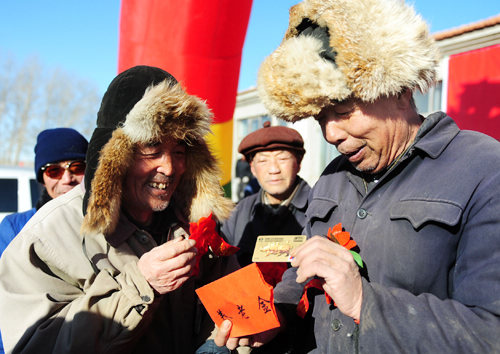|
 |
|
MY LIVELIHOOD: Farmers in Inner Mongolia Autonomous Region get bank cards for pensions (REN JUNCHUAN) |
Wu Xiaoqiu, a Beijing resident, clicked the "submit" button when he finished the questionnaire about the topics on the 2012 sessions of the National People's Congress and the National Committee of the Chinese People's Political Consultative Conference. The survey, launched by
People.com.cn, aims to list the top 10 topics on the public consciousness. Among the choices, Wu ranked "social security" as the top priority.
"Everyone is concerned about social security issues like pensions and health care, and we hope the government can do better in social security," said Wu.
The survey shows that social security has become the public's main concern while income distribution, which sat atop last year's list, came in second.
At present, the most controversial topic on social security is maintaining or increasing the value of the nation's pension fund.
China's basic pension system currently has a model that combines social collected funds with individual accounts. The former, paid by employers, is equivalent to 20 percent of the employee's average monthly wage in the previous year, and the latter, paid in monthly installments by employees, equals 8 percent of his or her average monthly wage from the previous year.
The system is designed to pay pensions for the retired with money collected from younger generations. The fund only needs to maintain a minimal surplus so that normal retirement pension payment can be secured.
To alleviate the pressure from an aging society in the coming years, individual accounts have been established. By making investment with these individual funds, the government can fend off future risks to the pension fund.
However, since the government didn't pay for the preliminary social collected funds prior to the establishment of the pension system, the fund in individual accounts is appropriated to pay current pensions in most parts of China. This has led to empty individual accounts and massive accumulated surplus in the social collected funds. Together with the depreciation of pension surplus, the situation has posed a great challenge to China's pension fund management.
Statistics released by the Ministry of Human Resources and Social Security showed that at the end of 2011, China's five social security funds—pension, medicare, unemployment, work injuries and maternity—had an accumulated surplus of 2.87 trillion yuan ($462.9 billion). The pension fund totaled 1.92 trillion yuan ($309.68 billion). Currently, investment channels for the pension fund are mainly bank deposits and treasury bonds.
Zheng Bingwen, Director of the Center for International Social Security Studies of the Chinese Academy of Social Sciences, said that with this kind of investment strategy, the annual yield rate after deducting the inflation rate is negative. In other words, the social security funds are depreciating.
"The nominal yield rate of social security funds is less than 2 percent, but China's consumer price index increased 5.4 percent in 2011. With a negative interest rate of 3.4 percent, the funds suffered a loss of nearly 100 billion yuan ($15.9 billion) in 2011," Zheng said.
Depreciation of social security funds imposes tremendous pressure on the full payment of pensions. It's obvious that great wisdom is needed to figure out how to manage the money and how to generate more benefits.
On December 15, 2011, Guo Shuqing, Chairman of the China Securities Regulatory Commission (CSRC), said the pension surplus should be invested in the stock market. The CASS later unveiled its 2011 China Pension Development Report, suggesting the Chinese Government set up an investment company which is specialized in managing the pension fund.
Zheng said China's investment mechanism for the social security funds differs greatly from that in other countries. It's the only one that completely relies on bank interest as its major investment returns.
"It is imperative for China to carry out market-oriented reform of its social security fund investments. The sooner, the better. It would not only help to prevent depreciation, but also help the government solve problems such as expanding coverage of the pension fund," Zheng said.
After the market-oriented reform, the pension fund only faces one difficulty: tumultuous shifts in the market. In contrast, if not reformed, the fund will face quite certain losses—depreciation, and the amount of losses will be "certain."
| 